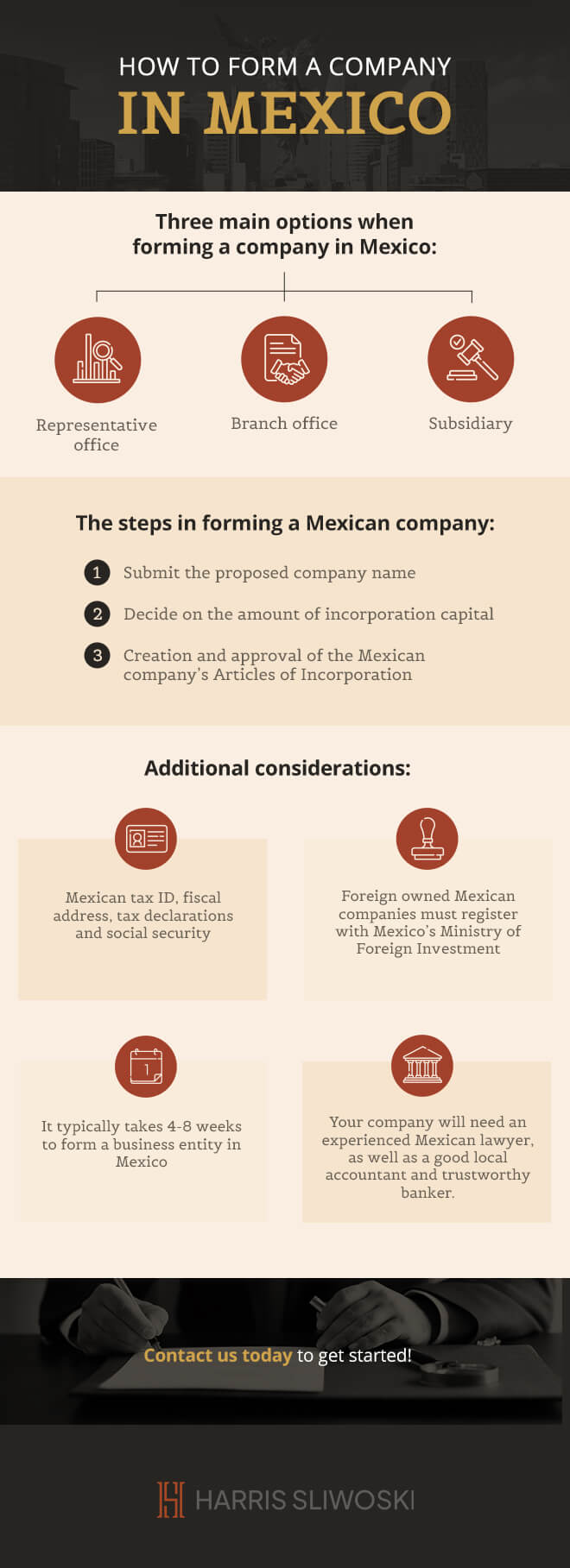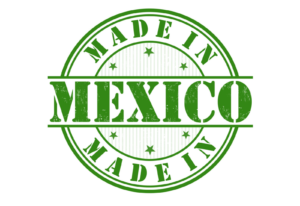Contents of this Article:
- Options when forming a Mexico company
- Choose the right Mexican entity for your business
- Steps to forming a Mexican company
- Mexican tax ID, fiscal address, tax declarations and social security
- Register with Mexico’s Ministry of Foreign Investment
- Additional issues on forming a Mexican entity
An investor looking to do business in Mexico typically must first decide on the form of business entity it will use to conduct its Mexico operations. This post addresses the various sort of business entities common to Mexico and, what it takes to set up a company to conduct business in Mexico.
1. You have three main options when forming a Mexico company
1. Representative office, which cannot enter into legal transactions in Mexico but can promote the products or services of the foreign company, or conduct activities such as market research;
2. Branch office, which is permitted to sign contracts with Mexican counterparts, as well as receive revenue from local entities, but whose actions confer legal liability on its foreign parent company;
3. Subsidiary, which is a foreign-invested Mexican company and can conduct all legal and commercial transactions, as long as they are not restricted for foreigners. This is the typical way foreign companies go into Mexico and I estimate that roughly ninety percent of the companies we form in Mexico are formed as subsidiary companies.
2. How to choose the right Mexican entity for your business
The most appropriate legal entity will depend on the parent company’s objectives and activities. Companies that do not expect to engage in commercial transactions with Mexican counterparts and therefore do not expect to have to pay Mexican taxes may be fine with a representative office.
Companies that will need to engage in commercial transactions to issue and/or pay invoices, but that do not need to establish a full Mexican legal presence, (with its attendant requirements to establish a board of directors and hold shareholders’ meetings) may be fine with a branch office.
Companies that desire maximum flexibility usually choose to set up their company in Mexico by establishing a limited liability company (Sociedad de Responsabilidad Limitada, or S. de R.L.), as a subsidiary of the foreign parent. An S. de R.L. can be established with foreign shareholders and directors, and it provides liability protection for the foreign parent company. An S. de R.L. is similar to a US LLC (Limited Liability Company), and like a US LLC, it is usually the best choice for small businesses since it has fewer formalities and is easier to form.
The stock corporation (Sociedad Anónima, or S.A.) is another limited liability option for foreign businesses and investors. These Sociedades are somewhat similar to a U.S. corporation and, like a US corporation, their strict formalities and flexible share transfers make them well-suited for companies that plant to seek outside investment.
There are other structures (e.g. civil partnerships, non-profit companies and contractual joint ventures) that fit other purposes for those seeking to enter the Mexican market for the first time, but about 99% of the companies our Mexican lawyers form in Mexico are Representative Offices, Branch Offices, or Subsidiaries.
3. The steps in forming a Mexican company
When our Mexican lawyers are retained to help a company set up a legal entity in Mexico, the first thing we do is work with them to determine the best corporate/company structure for their particular situation and goals. Once we have determined that, our next step is usually to submit the proposed company name to Mexico’as Ministry of Economy (Secretaría de Economía) for approval. If your preferred name is also a brand name, you should also be sure to register that name as a trademark with Mexico’s Patent and Trademark Office (IMPI-Instituto Mexicano de la Propiedad Industrial). Similarly, if you will be using any of your brand names or logos in Mexico, now is the time to figure out the Mexican trademarks you should be registering to protect those.
The next step is usually to decide on the appropriate amount of incorporation capital (the minimum per shareholder/partner is 1 peso, which is virtually no minimum at all). Then comes the creation and approval of the Mexican company’s Articles of Incorporation, which will include by-laws containing the company name, its corporate purpose, its corporate domicile, its shareholder name(s) and capital structure, and directors and management.
With few exceptions, Mexico company incorporations must be formalized before a Notary Public or a Commercial Notary Public. Your new Mexican company also must registered with the Public Commercial Registry.
4. Mexican tax ID, fiscal address, tax declarations and social security
To obtain a Mexican tax ID (which is absolutely essential), your Mexican companies must have a fiscal address and we generally recommend that your Mexican company’s purpose and activities in Mexico determine its locale and its fiscal address. It almost never makes sense to have your company’s fiscal address be in Guadalajara if all or nearly all of its activities and personnel will be in Mexico City. With your Mexican company’s tax ID in hand, your new entity will be responsible for making its monthly and annual tax declarations at the Mexican Tax Administration Service (SAT-Servicio de Administración Tributaria).
Once your new Mexican company is ready to operate and hire employees, it will need to register with Mexico’s social security agency, the Instituto Mexicano del Seguro Social (IMSS), as well as with Mexico’s National Worker´s Housing Fund (INFONAVIT). Hiring foreign employees requires a special permit — the Constancia de Inscripción del Empleador, — which must be renewed annually.
5. Foreign owned Mexican companies must register with Mexico’s Ministry of Foreign Investment
Finally, when one or more of owners of a Mexican company is a foreigner, the company must also register with the Ministry of Foreign Investment within 40 days after the business incorporation date.
6. Additional issues on forming a Mexican entity
It typically takes 4-8 weeks to form a business entity in Mexico; COVID has slowed down Mexico company formations. When a Mexican company formation’s paperwork is complete and all Mexican government approvals have been received, your Mexican entity will then be able to open its own bank account in Mexico. In addition to needing an experienced Mexican lawyer to form your Mexican company properly, your company also should have a good local accountant and a trustworthy banker.
The benefits of forming a company in Mexico are significant. Mexico has no capital controls for repatriation of profits, its judicial system is good at protecting property rights, and the initial capital requirements are minimal. And though forming a company in Mexico will require you jump through the various bureaucratic hoops described above, it is actually relatively easy for those of us who do it all the time. The World Bank currently ranks Mexico 60 out of 190 countries in ease of doing business, which puts it two rankings below Italy and one below Chile, but ahead of Luxembourg, Costa Rica, Greece and Panama, among others.

























